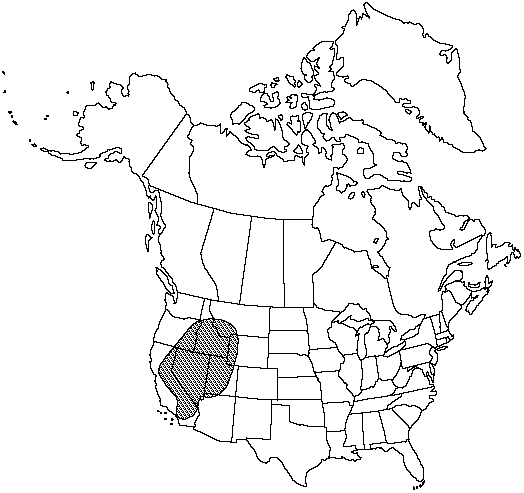Selaginella watsonii
Bull. Torrey Bot. Club 25: 127. 1898.
Plants on rock or terrestrial, forming long or compact cushionlike mats. Stems radially symmetric, decumbent to long-creeping, not readily fragmenting, irregularly forked, without budlike arrested branches, tips straight; main-stem conspicuously determinate, lateral branches conspicuously or inconspicuously determinate, strongly ascending, 1–3-forked. Rhizophores borne on upperside of stems, throughout stem length, 0.35–0.55 mm diam. Leaves monomorphic, in alternate pseudowhorls of 4, tightly or loosely appressed, ascending, green, linear-lanceolate, (2.5–) 3–4 × 0.5–0.7 mm; abaxial ridges prominent; base cuneate, decurrent, glabrous or sometimes pubescent; margins entire or short-ciliate, cilia transparent, scattered, spreading, 0.05–0.1 mm; apex strongly keeled, obtuse, abruptly bristled; bristle whitish to transparent, smooth, 0.25–0.5 mm. Strobili solitary, 0.5–3 (–3.5) cm; sporophylls lanceolate to ovatelanceolate, abaxial ridges well defined, base glabrous, margins entire, rarely dentate, apex strongly keeled to truncate in profile, short-bristled.
Habitat: On exposed or shaded cliffs, rocky slopes, rock crevices, granite boulders, quartzite rock, gravelly or sandy soil, alpine meadows, or swampy grounds
Elevation: 1800–4300 m
Distribution

Ariz., Calif., Idaho, Mont., Nev., Oreg., Utah, Wyo.
Discussion
R. M. Tryon (1955) suggested that Selaginella watsonii is a possible ancestor of (or shares a common ancestor with) S. leucobryoides, S. asprella, and S. utahensis (see discussion).
Selected References
None.